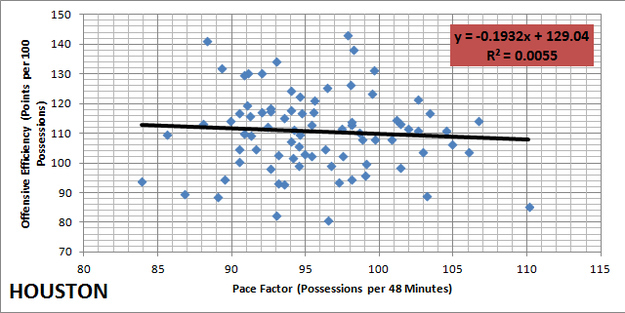
The NBA playoffs are a different beast than the regular season. You know this. I know this. We all know this. The pace of the game slows to a crawl as players expend maximum energy on defense; moving the ball or beating your man down the floor becomes harder, while the more physical D also leads to more fouls that interrupt the flow of the game. Any team that normally plays fast is D.O.A. unless it can figure out a backup strategy.
We've all heard this said, and probably said it ourselves. But is it true? I looked at the question specifically in reference to this year's most prominent run-and-gun teams, the Denver Nuggets and the Houston Rockets. The Nuggets hold the Western Conference's third seed, and beat Golden State in the first game of their series Saturday. The Rockets are an eighth-seed underdog against West favorite Oklahoma City, where they were blown out last night. Their playoff success obviously depends on a lot of factors, but will a slower pace be one of them?
I first checked to make sure the pace of the game was actually slower in the playoffs. On that issue, at least, the conventional wisdom is correct. Over the last five years, teams average somewhere between two and 4.5 fewer possessions per game in the playoffs than in the regular season. That may not seem like much at first glance, but here's another way of putting it: the average playoff pace in 2011, for example, was lower than the slowest regular-season team's pace.
So the game does get slower. How does pace influence offensive output? Let's look at Denver and Houston. Both teams spent most of the season playing at impossibly fast speeds. The league average number of possessions per game this season was 92.0. Denver's pace was 95.0, Houston's an even more ridiculous 96.2, a full two standard deviations above the mean (HIDE THE KIDS! MATH TERMS!). They're also two of the most efficient offensive teams in the league. Even adjusted for pace, Denver and Houston were the fifth- and sixth-best offenses in the league, respectively.
But are they able to score so efficiently BECAUSE they play fast? It sounds like a reasonable assumption — teams that play fast will get more easy baskets in transition, and they'll create quick scoring chances before the opposing defense is able to set up. You might expect them to tend to play worse in games in which they don't get quite as many of these easy chances as they're used to. So I charted each game of Houston and Denver's seasons besides their last one, which they hadn't yet played while I was doing the research. That's 81 games for each team. On one axis I put the number of possessions they had, their "Pace Factor." On the other, their offensive efficiency. If they had a problem playing slow, we should see a slanted line: lower efficiency in games with lower pace.


But that's not what happened. The "r-squared" value for each team is less than .01, which is to say that there's very little correspondence between pace and efficiency. The slope of Houston's trendline is actually very slightly negative, which means they actually played a tiny bit better this season when playing slower. Each squad had some of their best offensive games of the year playing slow, and some of their worst playing fast. Denver and Houston are just as good offensive teams regardless of how fast the game is moving.
There could be more work done on this issue, of course. We could expand our study to include more fast-break teams from years past. We could consider whether other playoff-specific factors might hurt fast-paced teams — perhaps there are more fouls called in the playoffs, which could make the game choppier without affecting the overall number of possessions. Maybe, for some reason, fast-break teams tend to suffer more on defense in slow games than they do on offense.
In the end, neither Denver or Houston are likely to make much noise in the playoffs this year — Denver because of a recent ACL injury to starting forward Danilo Gallinari, Houston because of a general inability to play defense and the aforementioned matchup against Oklahoma City. But if and when they're eliminated, it doesn't seem like slow-paced games will be to blame.
